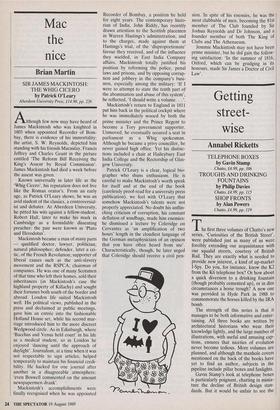Mac the nice
Brian Martin
SIR JAMES MACKINTOSH: THE WHIG CICERO by Patrick O'Leary
Aberdeen University Press, f14.90, pp. 226
Although few now may have heard of James Mackintosh who was knighted in 1803 when appointed Recorder of Bom- bay, there is evidence of his immortality: the artist, S. W. Reynolds, depicted him standing with his friends Macaulay, Francis Jeffrey and Charles Grant in the picture entitled 'The Reform Bill Receiving the King's Assent by Royal Commission'. James Mackintosh had died a week before the assent was given.
Known universally in later life as the 'Whig Cicero', his reputation does not live like the Roman orator's. From an early age, as Patrick O'Leary shows, he was an avid student of the classics, a controversial- ist and debater. At Aberdeen University, he pitted his wits against a fellow-student, Robert Hall, later to make his mark in Cambridge as a formidable dissenting preacher: the pair were known as 'Plato and Herodotus'.
Mackintosh became a man of many parts — qualified doctor, lawyer, politician, natural philosopher; defender, later a cri- tic, of the French Revolution; supporter of liberal causes such as the anti-slavery movement and the RSPCA; chairman of companies. He was one of many Scotsmen of that time who left their homes, sold their inheritances (in Mackintosh's case the highland property of Killachy) and sought their fortunes both south of the border and abroad. London life suited Mackintosh well. His political views, published in the press and declaimed at public meetings, gave him an entrée into the fashionable Holland House set, while his second mar- riage introduced him to the more discreet Wedgwood circle. As in Edinburgh, where 'Bacchus and Venus held court' in his life as a medical student, so in London he enjoyed 'dancing until the approach of daylight'. Journalism, at a time when it was not respectable to sign articles, helped temporarily to maintain his financial credi- bility. He hacked for one journal after another in a disagreeable atmosphere: 'even Boswell commented on the amount newspapermen d ran k '.
Mackintosh's accomplishments were finally recognised when he was appointed Recorder of Bombay, a position he held for eight years. The contemporary histo- rian of India, John Riddy, has recently drawn attention to the Scottish placemen in Warren Hastings's administration, and to the charges, made against them at Hastings's trial, of the 'disproportionate' favour they received, and of the influence they wielded, in East India Company affairs. Mackintosh totally justified his position by reforming the police, penal laws and prisons, and by opposing corrup- tion and jobbery in the company's busi- ness, especially among the military: 'If I were to attempt to state the tenth part of the abomination and abuse of this system', he reflected, 'I should write a volume. .
Mackintosh's return to England in 1811 put him back in the political cockpit where he was immediately wooed by both the prime minister and the Prince Regent to become a Tory government supporter. Unmoved, he eventually secured a seat in parliament as a Whig spokesman. Although he became a privy councillor, he never gained high office. Yet his distinc- tions included a chair at Haileybury East India College and the Rectorship of Glas- gow University.
Patrick O'Leary is a clear, logical bio- grapher who shuns enthusiasm. He is careful to make Mackintosh's worth speak for itself and at the end of the book (carelessly proof-read for a university press publication), we feel with O'Leary that somehow Mackintosh's talents were not properly appreciated. No doubt his unflin- ching criticism of corruption, his constant deflation of windbags, made him enemies: he dismissed a lecture by Coleridge on Cervantes as 'an amplification of two hours' length in the cloudiest language of the German metaphysicians of an opinion that you have often heard from me'. Characteristically, though, he later urged that Coleridge should receive a civil pen-
sion. In spite of his enemies, he was the most clubbable of men, becoming the 81st member of The Club founded by Sir Joshua Reynolds and Dr Johnson, and a founder member of both The King of Clubs and The Athenaeum.
Jemmie Mackintosh may not have been prime minister, but he did gain the follow- ing satisfaction: 'In the summer of 1816, Oxford, which can be grudging in its honours, made Sir James a Doctor of Civil Law'.


















































 Previous page
Previous page